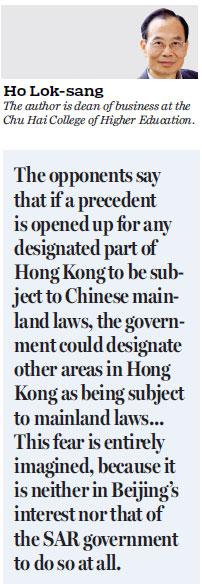Build a culture of caring for the common good
Updated: 2017-08-01 05:38
(HK Edition)
|
|||||||||
Ho Lok-sang believes endemic distrust in govt has created a run of stalemates and seeks a fresh focus on public interest
In the past few years Hong Kong has seen a lot of stalemates. There was a stalemate over the issue of standard working hours. There was a stalemate over how to handle the Mandatory Provident Fund offset issue. There was a stalemate over Medical Council reform bill. There was a stalemate over the Copyright (Amendment) Bill. And now there could be a stalemate over the Hong Kong government's proposal to have co-location of immigration checkpoints at the high-speed rail link's West Kowloon Terminus.

Each time there is a stalemate Hong Kong is at a standstill. In both the standard working hours issue and the MPF offset issue, it is employees against employers. Employee representatives walked out from the Labour Advisory Board meetings leaving only employer representatives to work out a proposal on standard working hours to submit to the government, which of course was routinely condemned by labor groups as unfair and pro-business. In the Medical Council reform bill issue, sadly it appeared as if it was doctors versus patients, as patient groups sought to import more doctors and have more non-doctor representatives on the council. As for the Copyright (Amendment) Bill 2014, one correspondent remarked: "Hong Kong might be one of the most wired cities on the planet but its copyright legislation remains a product of the pre-internet era - a situation that has ramifications for businesses, consumers of web content and an increasingly digitalized media alike." Since there are apparently no gainers and all parties appear to be losers, it is really not clear "who is against whom". Again, in the latest round of controversy over the joint immigration checkpoint issue, even though it appears that it is "pan-democrats" against the pro-establishment camp, killing the initiative really does not do anyone any good. A natural question then is: Why are some people so against it?
It seems to me that the alarmist tone of those who oppose this, as well as that of those who opposed the Copyright (Amendment) Bill, reflects fear and distrust. But this is really like shooting ourselves in the foot. The Copyright (Amendment) Bill had the support of the then chairperson of the Hong Kong Bar Association, who certainly has no reason to undermine the broader interests of Hong Kong. Those who opposed the bill feared it would restrict creative freedom. But the government was mindful to exclude anyone from any legal liability if derivative material based on copyrighted works was created for the purposes of parody, satire, caricature, pastiche or commentary on current events. This is similar to what other governments have done for their lands. Why are people in Hong Kong more worried than others? The fear reflects nothing but a lack of trust for the government, and this is a real problem that needs to be addressed.
Similarly, the objection to the proposed arrangement for a joint immigration checkpoint reflects a lack of trust for the Hong Kong government and for Beijing. The opponents say that if a precedent is opened up for any designated part of Hong Kong to be subject to Chinese mainland laws, the government could designate other areas in Hong Kong as being subject to mainland laws, and then Hong Kong people would no longer be protected by the Basic Law. This fear is entirely imagined, because it is neither in Beijing's interest nor that of the SAR government to do so at all. The fact is that if Beijing wants to take over Hong Kong altogether there would be nothing Hong Kong people could do to resist it. But Beijing has chosen to preserve Hong Kong as it is for a good reason: The status quo is in the interests of Hong Kong and the mainland. Beijing has always been very pragmatic in economic and in legal reforms, and the direction is very clear. It is relentlessly opening up the mainland to the rest of the world, to the extent that more and more mainland residents are finding the mainland a free land where they can find their dreams. Last year 122 million mainland tourists made outbound trips, spending $109.8 billion, and they all returned to their homeland. From 1978 to the end of 2015, the cumulative total of mainland students going abroad to study was 4.04 million. About 80 percent of graduates have returned to the mainland. Moreover, more and more Hong Kong people are now living on the mainland. What is there to fear?
To ward off this fear and distrust, it is imperative that we strive to build a new culture of pragmatically caring for the common good. I had earlier proposed that the Labour Advisory Council needs to include citizen representatives who will counterbalance the narrow perspectives of employers and employees. The government's proposal to expand membership of the Medical Council is similar in spirit. But this is not enough. The government should avoid feeding distrust and suspicion with any thoughtless deviations from accepted standards and procedures, and should welcome constructive policy proposals from the opposition parties.
(HK Edition 08/01/2017 page8)